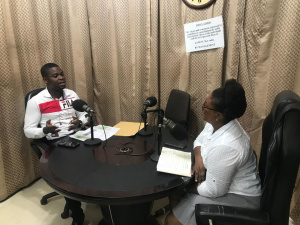
The Information Services Department in collaboration with the Municipal Marriage Department organized a sensitization session for the indigenes of Krowor at Latenu Radio (96.1 MHz) on Tuesday, 1st July 2025.
Mr. Joseph Ashitey Armah, Marriage Registrar at the Krowor Municipal Assembly educated listeners on the legal framework and distinctions between Customary and Ordinance marriages as recognized under the Ghanaian law. He explained the lawful procedures and rights for individuals intending to marry under either system, particularly regarding registration through the Local Assembly.
Mr. Ashitey Armah further stated that, customary marriage, also known as family marriage, is legally recognized and permits a man to marry multiple wives in accordance with traditional and cultural practices. And further noted that such marriages can be registered under the Customary Marriage Registration System. He also explained that the process begins with the family, where all traditional rites and customs must be fully performed. Following this, an affidavit must be sworn to affirm that the marriage has taken place.
He added that the couple is then required to report to the Assembly to register the marriage. A mandatory waiting period of 28 days is observed, during which a marriage ban is published for 21 days to allow the public to raise any objections. Once the period elapses, the couple returns to the Assembly to sign the marriage register, accompanied by two witnesses who must also sign to confirm the process. He also pointed out that ordinance marriage is strictly monogamous and governed by civil law and further emphasized unlike customary marriage, a person cannot have more than one spouse under the ordinance system. Any attempt to do so constitutes bigamy, which is a criminal offence.
According to Mr Armah, the process involves a 21-day public notice or marriage ban to allow for objections. After this period, the couple may sign the marriage register either at the Assembly or in a licensed church. or in a licensed church, with both venues being equally valid in the eyes of the law. He also highlighted that where a party was previously married, either a divorce certificate or a death certificate must be submitted to verify that prior marriage has ended. In addition, he explained that transitioning from a customary to an ordinance marriage becomes monogamous. In such cases, all other existing spouses must be legally divorced before the ordinance marriage can be registered.
Mr. Joseph Ashitey Armah concluded by stressing the importance of understanding the legal implications of both marriage types and encouraged participants to ensure all documentations are properly completed with all traditional requirements fulfilled. Furthermore, he warned of the legal consequences of violating marriage laws, particularly those related to bigamy and advised the public to seek guidance from the Assembly before entering or registering any form of marriage.
During the call-in segment, the first caller sought clarification on the difference between the types of marriage certificates. In response, Mr. Armah explained that the customary marriage certificate is printed on white paper while the ordinance marriage certificate has a bluish-green hue. He further clarified that a marriage registered under the customary law permits polygamy, thereby allowing the addition of more spouses. Conversely, a marriage registered under the ordinance is monogamous and the individual cannot enter another marriage without dissolving the first.
The second caller inquired about the number of witnesses required to sign the marriage certificate. Mr. Armah stated that for customary marriages, two witnesses are required with one from each party while with an ordinance marriage, four witnesses are required. Two each from the bride and groom’s side. Another caller asked whether it is appropriate to verify if a pastor has the legal authority to officiate marriages. Mr. Armah confirmed that such inquiries are valid and encouraged, as only pastors who are registered and licensed under the Marriage ordinance are legally permitted to officiate with such unions.
A subsequent caller requested information regarding the issuance of marriage certificates for Muslims. Mr. Armah affirmed that Muslims are also entitled to register their marriages and receive official certification, provided the necessary legal processes are followed. The final caller asked whether marriages can be dissolved and if so, by whom. Mr. Armah emphasized that only the courts have legal authority to dissolve a legally recognized marriage. No other individual or entity has the mandate to annul a marriage outside of the judicial process.

